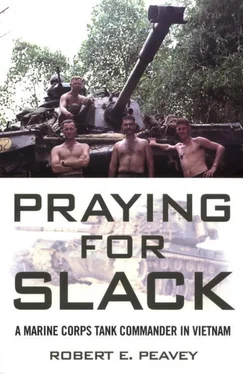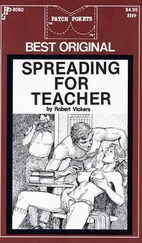It took a few minutes before the CP could confirm it: A gun battery at Con Thien was indeed providing the illumination. The CO was able to get the illumination lifted, and the mysterious buzz bombs finally ceased.
The next morning revealed the mystery thud- makers—as I’d suspected, howitzer illumination projectiles. This place was getting crazier and crazier. Now I had to worry about being conked on the head by a five-pound projectile from one of our own guns!
Just as I had suspected all along, everybody was out to get me—even the friendlies. I could just see my mother opening the letter: Dear Mrs. Peavey, We regret to inform you that your son, who almost made it out of Vietnam, was killed during enemy action while serving in northern I Corps on the Demilitarized Zone. He was hit in the head by a buzz bomb.
THE FOLLOWING MORNING, via the radio, the message I’d awaited for thirteen months finally found its way to me: “Papa 2283 was to report to the Battalion CP in Quang Tri the next day.”
Papa stood for the first letter of my last name; 2283 was the first four digits of my serial number—a way of identifying an individual over the air without revealing his name, lest the enemy possibly use that information on the home front. It was my orders to return to Dong Ha on the next day’s resupply run, without my tank, for the start of my long trip home.
The next morning we left our position and drove down to C-4. There, my crew would pick up a new TC and turn around and go right back to Oceanview.
It would be the last time I would ever see them. On their part, the goodbyes were genuine, but all I wanted to do was get the hell out of there.
The next part of my trip was by truck down to Cua Viet. Never had a ride down that familiar beach taken as long as it did that morning. Mysteriously, the shore had tripled in length and was strewn with dozens of unseen mines, each one with my name engraved on it. I was hunkered down in the back of the truck, never more grateful to be inside my two-part flak jacket, M14 at the ready, and pistol holstered under my left armpit. My eyes, just above the truck’s sidewalls, scanned the sand dunes, looking for an NVA I just knew was out there—and who didn’t want to let me go home.
I made it to Cua Viet and, eventually, to Dong Ha.
Next morning, after a sleepless night back at the company CP, I reported to the airstrip to wait for the first C-130 destined for Quang Tri. I knew that I was still facing the most dangerous part of the trip, for if my journey was going to get interrupted anywhere, it would be at the Dong Ha airstrip. Often, when a plane landed, NVA artillery opened up and tried to catch it on the ground, where it was most vulnerable. So at Dong Ha, planes never “stopped” in the traditional sense of the word. They just kept taxiing while their crews pushed out pallets of supplies. To catch a plane at Dong Ha, you chased after it and literally caught the plane as the last pallet rolled off.
We were told, to my surprise, that our plane had to take on some cargo and would actually stop for a few seconds. Ten of us were waiting for that same flight, half heading home and the rest going on R&R. We were all waiting in a slit trench running parallel to the runway. I was surrounded by nine very anxious men as the Marine C-130 began its steep approach to the runway.
A gunnery sergeant who ran the strip came over and said, “If you guys want to get out of here, ya gonna have to help with loadin’ some cargo. We can’t sit around here waitin’ for Charlie to shell us.”
“Shit, Gunny, we don’t mind. This is our bird out of here!”
With half of us going home and the others leaving for R&R, what did we care? We were only too happy to lend a hand, because none of us wanted to be caught on the ground by Charlie’s artillery. I had almost forgotten the first day I had landed at Dong Ha, six months earlierbut I was in for a quick refresher.
The C-130 touched down, immediately roared its engines in reverse to bring it to a stop at the end of the runway, and turned toward us. We were brought around the edge of the slit trench and told to kneel down behind a sandbag wall. The plane raced back up the runway, which was more like a straight dirt road. Billowing clouds of brown dust followed the plane as it taxied toward us at an alarming speed.
We were led around the revetment in a half-crouched run to muscle whatever cargo had to accompany us on the flight. Turning the corner, we ran right into two rows of… body bags!
We all came to an abrupt halt. “Oh, fuck!” I said.
“No fuckin’ way, man!” said another guy. “I’m outta here!”
In unison, several men yelled to the gunny, “You motherfucker!”
“Let’s go!” he yelled back. “Two men to a bag! Ya ain’t leavin’ till they’re all on!”
To load all twelve bags, we had to make several trips in and out of the aircraft. With the first five, we paired ourselves and tried to carry them at a run onto the plane. It was difficult, because one man had to run backward while carrying that weight up the ramp. As we hurried back and forth, we were all grumbling and bitching—“I don’t believe this shit!” and “I’m too short for this!”—and cursing out the cargo master. We hated anyone with a cushy job who hadn’t seen combat, especially any asshole who took advantage of us, like this one. Making us, the ones who did the fighting, load the dead was the final outrage.
The plane sat there too long. We had just gone back for the third haul when the first shell landed at the far end of the runway.
“Oh, shit!” I said, as my partner and I struggled with another bag.
“Charlie, you motherfucker,” he said. “You’re gonna make sure we don’t leave this place, aren’t you?”
From the front of the plane, the pilots screamed at us to get on. Already the crew chief was raising the ramp. Quickly we lugged the last bag up the ramp and set it in the middle of the floor along with the others. Out of breath, we sat on one of the two benches running along the airplane’s bulkhead.
Swiftly the plane taxied to the end of the runway, all of us praying that we would make it through the shelling. The plane turned. Its engines went to full power.
Crack! Crack! Two more rounds landed, one hundred meters off to the side of the runway. The plane rolled forward, engines going full bore. Inside, we hung on to keep from sliding backward.
Come on, I thought. Come on, you can make it! Others verbalized the same thing. We were going to will this goddamned plane off the ground.
Faster and faster we rolled down the dirt runway. Finally, we left the ground in a steep climb. To keep the cargo from sliding to the rear of the plane, everybody had to lean forward and grab a bag. Finally airborne, the ten of us sat back, glad that we didn’t have to cling to the bags any longer. We all sighed in relief, but it was restrained. There wasn’t the normal joy that ten guys leaving The Nam would display, not with the bags at our feet.
Nobody looked down, ignoring the silent cargo we had just loaded into this flying hearse. Each guy just stared at the man sitting across from him.
We each kept to ourselves, willing the plane to keep on flying. Our minds kept running through all the things that could easily still go wrong—and make us join up with those twelve who lay at our feet. We were the lucky ones, and we knew it. None of us talked. We wouldn’t insult those less fortunate who traveled with us, also going home.
The flight to Quang Tri took only ten minutes. No sooner were we up and we were landing again. Independently of one another, without uttering a word, all ten of us had arrived with the same game plan. They had gotten us to do their dirty work once, but there was no way they were going to get us again. At the first moment a survivable escape offered itself, each of us planned to exit that plane.
Читать дальше












